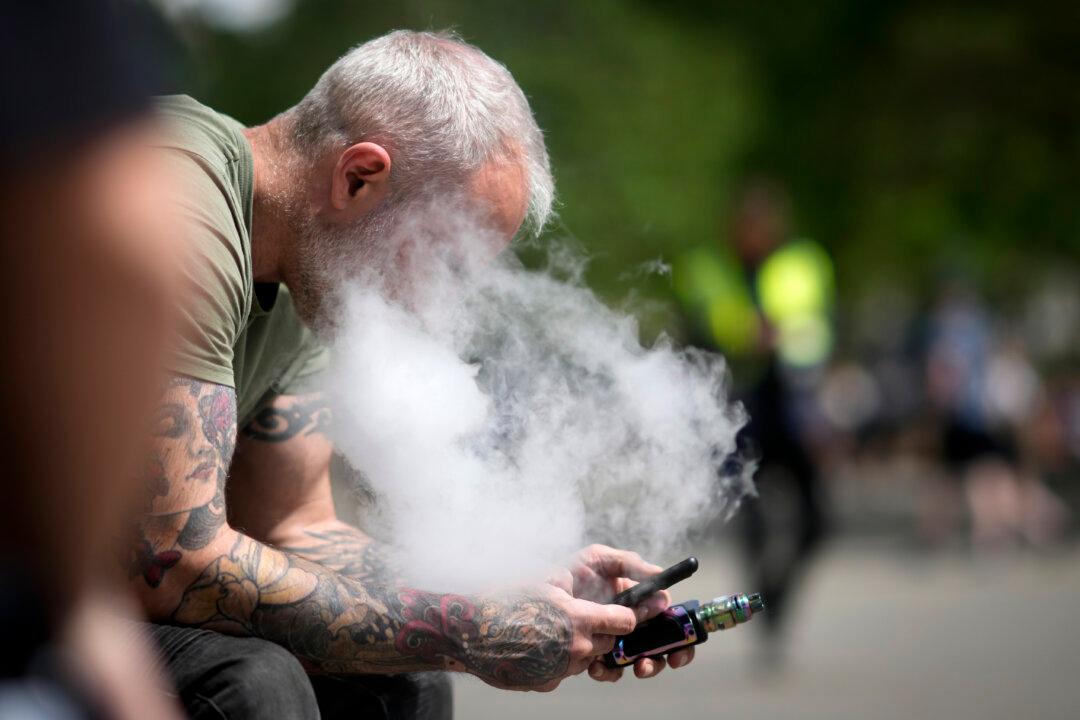The forthcoming disposable vapes ban may have a “limited impact” on the number of people using e-cigarettes, according to researchers.
It comes as a study highlighted there has been a “shift away” from disposable vapes since the ban was announced, with more people opting for refillable and reusable devices.
Academics from University College London (UCL) also suggest the rapid rise in e-cigarette use seen in Britain in recent years has “stalled.”
They warned that “stricter policy options” being reviewed around vapes could stop smokers using the devices to quit cigarettes.
The government announced plans to ban disposable vapes last January, with the measure coming into force on June 1.
The Tobacco and Vapes Bill, which is currently working its way through Parliament, also includes powers to potentially restrict the packaging, marketing, and flavours of e-cigarettes.
For the study, funded by Cancer Research UK, researchers looked at the Smoking Toolkit Study, an ongoing survey of adults in England, Wales, and Scotland.
The team analysed data collected between January 2022 and January 2024, which included responses from 88,611 people.
During the two-year period, vaping rates among those aged 16 and over increased from 8.9 percent to 13.5 percent.
In January 2024, more than 4 in 10 (43.6 percent) mainly used disposables, but this had fallen to less than a third (29.4 percent) a year later.
The decline was steeper among 16- to 24-year-olds, according to researchers.
Lead author Sarah Jackson, of the UCL Institute of Epidemiology and Health Care, said: “Our results also suggest that the government’s ban on disposables, coming into force in June, may have limited impact on vaping rates in general, given that vapers are already moving away from disposable vapes.
“It seems likely that people using these products will move to reusable versions rather than stop vaping completely.”
Elsewhere, researchers suggest “recent increases in vaping prevalence in Great Britain stalled.”
The analysis found that between January 2022 and January 2024 vaping rates among adults increased from 8.9 percent to 13.5 percent, with rates among young adults rising from 17 percent to 26.5 percent.
The academics said: “After the new policy measures were announced in January 2024, trends in current vaping prevalence changed.
“Among both adults and young adults, prevalence was no longer increasing and instead remained relatively stable.”
Jackson added: “Action is likely still required to reduce high vaping rates, but now that the situation has stabilised policymakers may be reassured that it would be sensible to avoid stricter policy options currently under review.
“Some of the options being considered may be more likely to have the unintended consequence of deterring smokers from using vapes to quit smoking.”
Professor Jamie Brown, also of the UCL Institute of Epidemiology and Health Care, said: “While it is understandable that policymakers want to take action to reduce vaping among children and never smokers, smoking remains the number one public health priority.
“These findings should reassure policymakers that they can prioritise measures, such as restrictions on marketing, packaging, and display, which are least likely to undermine how helpful vapes are for people trying to quit smoking.
“It is important that these measures are introduced alongside other messaging and policies that continue to encourage and support smokers to quit smoking, such as mass media campaigns and the swap to stop scheme.”
Commenting on the findings, Caroline Cerny, deputy chief executive of public health charity Action on Smoking and Health (Ash), said: “This data indicates that the government’s action on vaping is starting to shift both business practices and consumer behaviour.
“That’s a positive sign and shows that the planned regulations have potential to tackle the trend in youth vaping.
“At the same time, it’s important to strike the right balance: protecting young people while still supporting adults to stop smoking. With well-designed policies, we can achieve both.”
A government spokesperson said: “This study provides promising evidence that the rise in vaping amongst young people has stalled. The health advice is clear that whilst vapes can be an effective quit aid for adult smokers, children and non-smokers should never vape.
“The landmark Tobacco and Vapes Bill will put an end to the cycle of addiction and disadvantage by creating the first smoke-free generation and stopping the next generation getting hooked on nicotine.
“With 5 million disposable vapes either littered or thrown away in general waste every week last year, the single-use vapes ban will also crack down on waste and clean up communities.”






